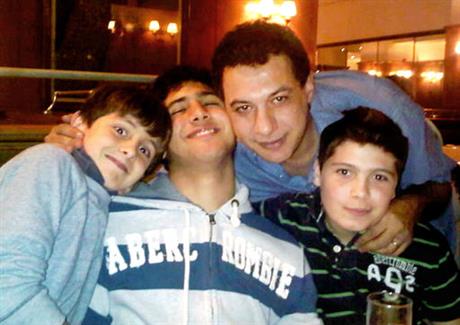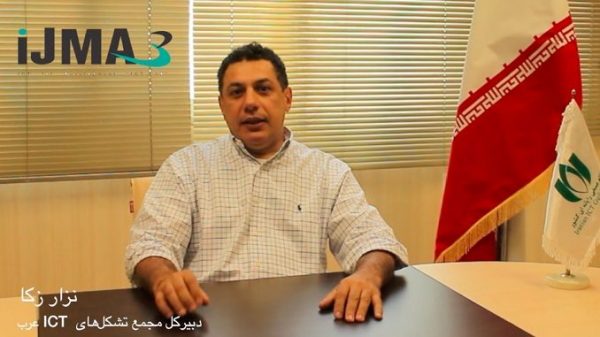
By Makram Rabah
All cultures place great emphasis on honouring guests and extending protection and hospitality. For the Arabs, a guest is a virtual extension of one’s pride and honour and, by custom, any guest is entitled to room and board, even before the host asks for a name and destination.
Equally, in the Persian culture, a proverb warns of the ominous fate of anyone who harms their visitor: “The Earth is a host who kills his guests.”
Unfortunately, that spirit doesn’t seem to stretch as far as Iran’s regime, which, since its inception in 1979, has mistreated guests and included hostage-taking as part of its foreign policy. In the public consciousness, people think such acts as restricted to the US Embassy hostages of 1979. However, Iranian prisons house a wide array of multinational prisoners and, among them, is Lebanon’s Nizar Zakka.
Zakka, a Lebanese businessman and information technology expert who holds US permanent residence, was snatched in September 2015 by Iranian authorities on his way to the airport. He was sentenced to ten years in prison for spying for the United States.
Ironically, Zakka had made the trip to Tehran on an invitation from Shahindokht Molaverdi, Iran’s vice-president for women and family affairs, to be a keynote speaker at a conference on women’s entrepreneurship.

The court that sentenced Zakka bypassed common judicial procedures and, despite this, was only able to accuse him of contacting the US government, which, in their book, was another word for espionage.
Zakka, who had made a very successful career for himself in Washington, where his family and children live, found his world turned upside down, accused of a crime he did not commit and caught up in a game he did not wish to play.
Much of the effort to secure Zakka’s release has been spearheaded by his family in Lebanon and the United States. Despite their ardent public and private appeals, the Lebanese government has taken no concrete actions, denying Zakka the basic rights accorded him as a Lebanese national.
The Lebanese Embassy in Tehran has refrained from offering assistance to Zakka or dispatched any consular staff to follow up on the case or even to sign legal papers allowing his family access to the required funds to support his cause.
Lebanese Foreign Minister Gebran Bassil told Lebanon’s Daily Star that the the government had done everything it could to secure Zakka’s release. “I personally contacted the [Iranian] foreign minister more than once, as well as his deputy and the [Iranian] ambassador in Lebanon and our embassy outside is following up all the time,” Bassil said. “We want him to return, that’s for sure.”
“At the end of the day, it is a case in the Iranian judiciary and we have agreements we must implement. We are calling for him to be released because it is part humanitarian, part political, part judicial, part lawful but it’s complicated,” Bassil said.
However, Nadim Zakka, Nizar’s son, voiced frustration at what he saw as the silence of the Lebanese political establishment, which he said has been intimidated by the presence of Iran-aligned Hezbollah among them.
“Iran kidnapped my father based on false and misleading information, probably coming from some of their partners in Lebanon,” Nadim Zakka said. “By the time they realised their mistake, they were caught in a catch-22 since they couldn’t release and admit they had kidnapped and taken hostage an innocent Lebanese who has never belonged to any political party anywhere in the world, which obviously includes Lebanon.”
In stark contrast to the Lebanese government’s tacit complicity in Iranian actions, the US government, in both the US Congress and the executive branch, have championed Zakka’s cause. Omar, Zakka’s younger son, has testified before the US House Foreign Affairs Committee to muster public opinion and demand the immediate release of his father. The US Senate took Zakka’s abduction further when Senator Marco Rubio, a Republican from Florida, introduced a measure explicitly to punish Iran’s continuing human rights abuses.
None of the US actions has helped Zakka and, despite repeated hunger strikes and the subhuman prison conditions he faces, the Lebanese Ministry of Foreign Affairs drags its heels. Melkar el Khoury Awad, a member of the Foundation of Human and Humanitarian Rights, said: “The Lebanese state does not seem to have taken all necessary and rightful steps in this case.”
Awad said the Lebanese government should demand sight of the evidence against Zakka, before asking for “his repatriation to Lebanon where, in case the evidence is real, Zakka should then stand before a Lebanese court.”
Despite his personal determination to avoid entangling either himself or his cause within Lebanon’s labyrinthine sectarian squabbles, Zakka exerted whatever leverage his heritage allowed and called Lebanese Prime Minister Saad Hariri last October from the pay phone within his jail. Nothing has happened.
Oddly, Zakka was on excellent terms with Michel Aoun prior to his election as Lebanon’s president, and, as secretary-general of the Arab Information and Communication Technology Organisation, Zakka had worked with Foreign Minister Gebran Bassil. As allies of Hezbollah, Aoun and Bassil could easily have aided Zakka’s release but he remains in an Iranian jail.
The Iranian regime might have assumed that Zakka’s status as a dual US national could be exploited like other Western hostages in any future deal. Yet the Zakka affair underscores two essential realities. First, that Aoun’s self-proclaimed status as the “father to all the Lebanese” has been undermined by his failure to protect a citizen from the oppression and tyranny of his own allies.
Second, the next time you’re asked to read an oily treatise on the beauty of Persian culture, inviting you to visit Iran, ask yourself if they may lead you to sharing a cell with Nizar Zakka and other prisoners of conscience.
Originally published in the Arab Weekly

Leave a Reply
You must be logged in to post a comment.